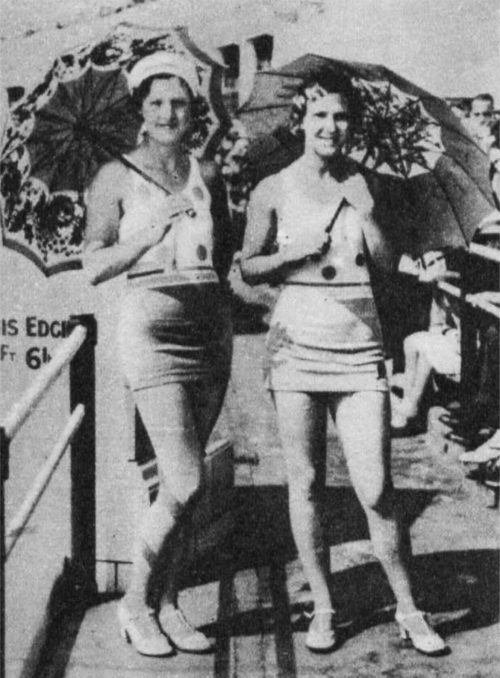All Our Yesterdays looks back on Bank Holiday 1937
Back in time 25 years to the Blackpool Pleasure Beach


WHAT are you doing this Bank Holiday? Off to the seaside again, or the country, perhaps?
Or maybe you’ve decided to stay out of the way of all the hazards of August Bank Holiday? Perhaps the garden will get the going over you promised it weeks ago?
Bank Holidays have not changed all that much over the years — as Granada’s All Our Yesterdays on Monday will show, when Brian Inglis looks back 25 years.
What were they up to — the Bank Holidaymakers of 1937?

Well, there was a heatwave then. That’s worth remembering. And it was King George VI’s Coronation year. That might jog a memory.
But has the passing of 25 years changed the pleasures and pursuits of Bank Holiday all that much?
As you prepare for the weekend, heatwave or no heatwave, you’re probably more concerned about what to put in the sandwiches than about Mr. Macmillan’s reshaped Government, the Common Market, who is orbiting the world, or Berlin.
In the same way that people carried on regardless 25 years ago. when China and Japan were at war, and Neville Chamberlain, then Chancellor of the Exchequer, complained of “that fear of attack which is almost universal, but which may yet rest on nothing more solid than imagination.”
No, it wasn’t all that different, was it?
The newspaper headlines blared: “Most amazing Bank Holiday homecoming on record. Everything on wheels on the road.”
“Blackpool and the sun smash records. Record crowds by rail and road.” “10.8 hours sunshine. 76 in the shade.”
Not so many families had cars in 1937. But it was the same old story …
One newspaper demanded: “What of the roads? They are congested. We haven’t enough long, loud, straight, ugly roads … what’s the good of a motor car if you’ve no road to put it on?”
In fact, in 1937 there were three million vehicles on our roads. East year, there were 10 million. Goodness knows what sort of chaos we shall read about this weekend.

Of course, prices were different. Very different. As you fill up the tank at the weekend, consider that it could be filled up 25 years ago at 1s. 7d. a gallon.
In 1937, holiday-makers spent £1 million on ice cream. This year they are expected to spend £9 million.
A penny cornet bought on the promenade 25 years ago costs 4d. or 6d. now.
First-class hotels in Blackpool then provided fully inclusive accommodation from 12s. 6d. a day.
A good three course lunch, with coffee, cost 2s. A large breakfast cost the same, and a fish and chip supper with bread, butter and tea was 1s.
But what were the other attractions? There was a great thing about keeping fit. Walking holidays were popular with young people.
In London, the advertisements said: “Come to ‘appy ’Ampstead … all the fun of the fair.” The new Marx Brothers film A Day At The Races was showing.
In Blackpool, the stars at the Grand Theatre were Gracie Fields and Frank Randle. George Formby was at the Opera House. Roy Fox and his band topped the bill at the Palace (now demolished). More than 100,000 people visited the Tower to dance, tour the zoo and listen to Reginald Dixon at the organ.
Harry Porter, Blackpool’s publicity director, told me: “Today, you see more and more bikinis, shorter shorts, and the youngsters on scooters and motor bikes are more exuberant. But things haven’t changed much. People still enjoy themselves in the same old way.”
Talking about bikinis, there was a great fuss over the beach fashions in America in 1937. Men’s bathing suits that season were of the topless variety.
And bathers on Long Island beach were asked by officials: “Why isn’t your chest covered, sir?”
In Britain, the youngsters were dancing the Lambeth Walk and a popular dancehall version of Knees Up Mother Brown. Now they have the Twist.
They were listening to “pop” records of a popular crooner called Bing Crosby. Now it is more likely to be Cliff Richard.
For the stay-at-homes, radio was a big thing.
This year you can take your choice of television programmes, which include a huge coverage on ITV of the day’s top sporting events. The Lancashire v. Yorkshire cricket match, for example.
In 1937, visitors to London were able to watch television at a big demonstration at Olympia, which was billed:
“Judge for yourself what television can do.”
Today, of course, we are judging what Telstar can do.
A friend of mine suggested that the habits and manners of holiday-makers have changed drastically in the past 25 years.
“Going to the seaside was a big thing in those days,” he said. “Now it isn’t. People just accept it as they would accept the fact if the Americans landed on the moon tomorrow.”
But I don’t know. Basically. I don’t think Bank Holiday has changed all that much. We’ll still be doing the things this weekend that we did 25 years ago.
And. who knows, we might even be blessed with a heatwave.





